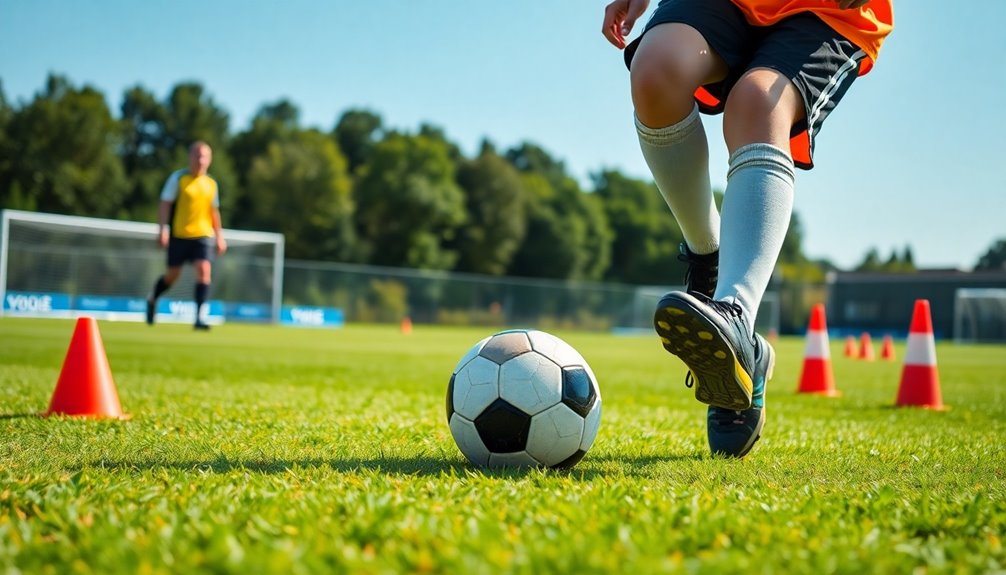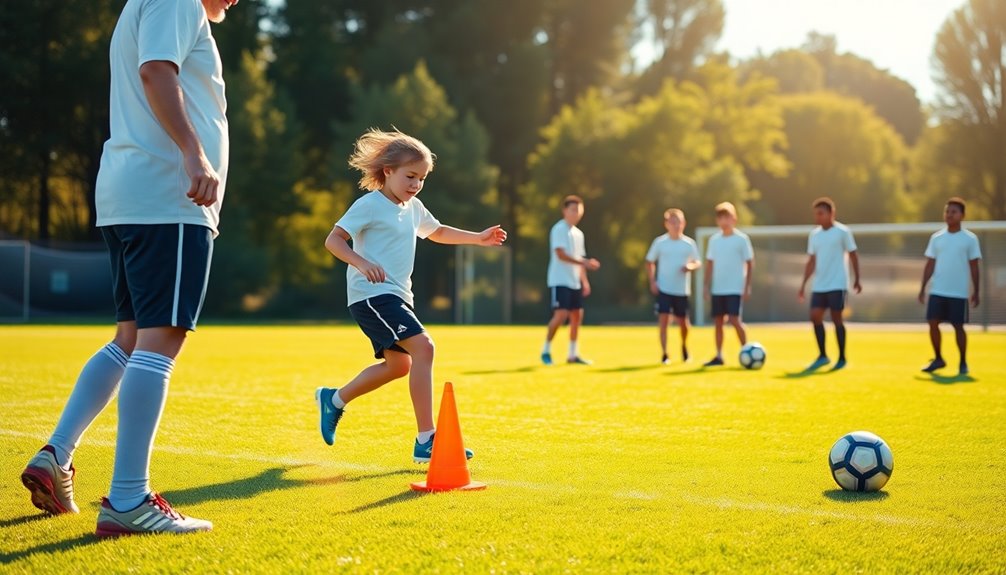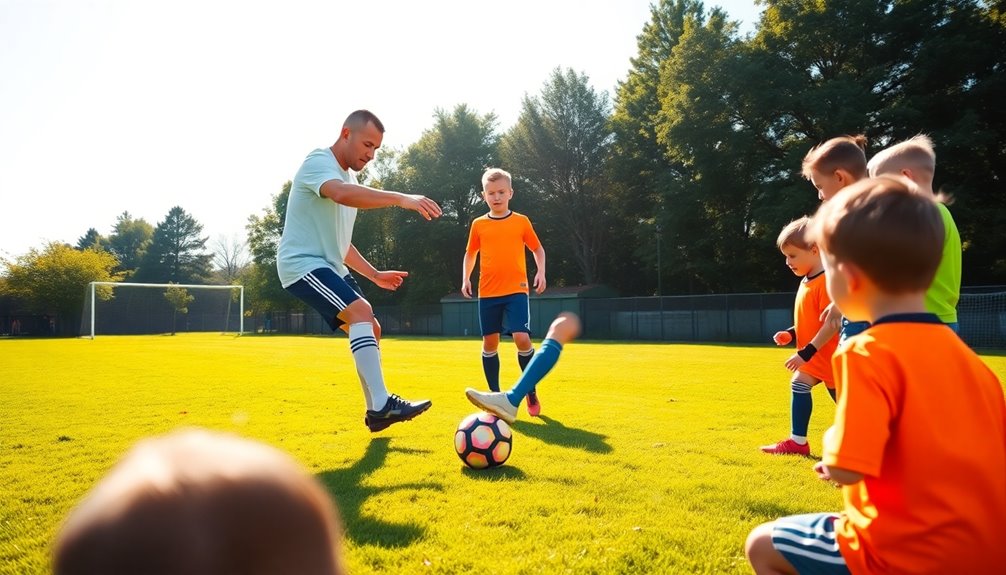
Soccer Fundamentals: The Building Blocks of a Great Player
February 12, 2025To become a great soccer player, you need to master the fundamentals. This includes key skills like dribbling, passing, shooting, and ball control. These basics form the foundation for advanced abilities, allowing you to be more versatile on the field. Regular practice, like cone dribbling drills and small-sided games, can greatly enhance your comfort and decision-making under pressure. Plus, maintaining self-reflection and seeking feedback helps you track your progress. The right coaching strategies will also improve team communication and cohesion. If you're enthusiastic to elevate your game further, there's much more to explore.
Importance of Soccer Fundamentals
When it comes to soccer, mastering the fundamentals is essential for any player. You need to develop skills like dribbling, passing, shooting techniques, and ball control to succeed on the field. Practicing advanced skills like the elastico and step-over can elevate your game and make you a more dynamic player.
These basic elements serve as the groundwork for more advanced skills and complex gameplay. Without a strong grasp of these fundamentals, your progression to intricate plays can be hindered.
Focusing on player development means you'll become more versatile and adaptable, allowing you to respond effectively to various game situations. This adaptability is vital, as it enhances not just your individual performance but also contributes to your team's overall success. Coaches should prioritize these fundamental skills during training sessions, incorporating soccer drills that reinforce these basics, such as speed and agility drills which are crucial for improving overall game impact.
When all players collectively master these skills, the entire team benefits, improving cohesion and performance. Additionally, integrating endurance training methods into practice helps ensure players maintain stamina throughout the game.
Key Techniques and Skills
Mastering key techniques and skills is essential for any soccer player looking to elevate their game. One of the most vital skills is dribbling, which enhances your ball control, allowing you to navigate tight spaces and maintain possession during play. When you practice dribbling drills, you'll improve your ability to maneuver past defenders effectively.
Passing is another fundamental skill that fosters teamwork and creates scoring opportunities. Focus on accuracy in your passing drills, as precise passes lead to better possession and tactical execution on the field. Additionally, incorporating strategic passing techniques can create scoring opportunities for your team during matches.
Next, let's talk about shooting. Players shooting with precision and technique can greatly impact the game, making it imperative to master this skill. Incorporate finishing drills into your training to refine your shooting abilities and increase your scoring potential.
Finally, understanding basic tactics, including positioning and movement off the ball, will enhance your overall gameplay. By integrating effective ball control and these essential techniques into your practice routine, you'll become a more versatile and valuable player.
Embrace these skills, and watch your performance soar on the field!
Drills for Skill Development

To effectively develop your soccer skills, regularly incorporating focused drills into your training routine will make a significant difference.
Start with Cone Dribbling drills to enhance your comfort and control with the ball. This foundational skill is essential for effective dribbling in matches, and mastering basic moves will enable you to outmaneuver defenders more efficiently. Practicing close ball control during these drills will help you navigate through tight spaces.
Next, introduce one-on-one situations during your training sessions. These scenarios simulate game-like pressure and help you practice both dribbling and decision-making.
Incorporate small-sided games into your practice. These games encourage you to develop your dribbling skills in tight spaces, promoting quick thinking and adaptability during gameplay.
Additionally, don't forget to include shooting exercises that mimic real match conditions. Focusing on precision and technique will build your goal-scoring confidence.
As you progress, make sure that you move from basic to advanced drills for skill development. This continuous evolution allows you to master foundational techniques and apply them effectively in competitive settings.
By consistently practicing these drills, you'll notice a marked improvement in your overall performance on the field. Moreover, incorporating vision training exercises can further enhance your decision-making skills during gameplay.
Make these drills a regular part of your training, and you'll see the benefits in your gameplay.
Assessing Player Progress
Evaluating player progress is essential for developing fundamental soccer skills. Regular assessments, like observational analysis and performance metrics, help you gauge how well you're mastering those skills. To track your improvement effectively, you should set specific goals that target areas needing attention, whether for individual or team play.
Constructive feedback from coaches is crucial in this process. It highlights your strengths while identifying aspects that need improvement. When coaches provide clear insights, it makes it easier for you to focus on what to enhance next. Additionally, effective communication is vital for fostering a constructive feedback environment that encourages player growth.
Furthermore, the commitment to hard work and motivation is essential in ensuring you stay on track with your development goals.
Additionally, encouraging self-reflection on your skill execution fosters personal accountability. By thinking critically about your performance, you can better understand your growth and learning outcomes. Consistent training is crucial for adapting to various game situations, enhancing your overall mental resilience in the process.
Consistent evaluations not only help you recognize your progress but also maintain your motivation to improve. Soccer coaching isn't just about drills; it's about shaping players who understand their development journey.
Coaching Strategies for Growth

To start, coaches must set clear, achievable goals for player development. When each player understands their objectives, they're better equipped to reach them.
Creating a supportive learning environment is essential, so make certain to communicate effectively and provide constructive feedback that motivates players to improve their skills. This open communication fosters trust and encourages players to express their concerns and aspirations.
Structured training plans are important for balanced skill development. Cover fundamental techniques while integrating game strategies to guarantee thorough growth. By doing this, players not only refine their individual skills but also learn how to apply them in various situations. Incorporating small-sided games into training can further enhance their defensive skills and strategic understanding.
Additionally, coaches can empower players through tactical awareness, enabling them to make informed decisions during games. This adaptability is critical for success on the field.
Regular assessments and feedback help track individual progress, allowing you to adjust your training methods to meet each player's evolving needs. Incorporating mental training techniques can also enhance players' focus and resilience, further supporting their growth.
Ultimately, a focused approach to coaching strategies can greatly enhance player growth, fostering a deeper understanding of the game while honing their abilities. Emphasizing communication, structure, and adaptability will guarantee your players develop into well-rounded athletes.
Enhancing Team Communication
Effective communication on the soccer field is essential for building a cohesive team. In Youth Soccer, clear communication guarantees that every player knows their role and understands the strategy.
When you're on the field, you need to help your teammates keep the ball and make effective plays. To enhance team communication, consider these strategies:
- Verbal Cues: Use clear directions and encouragement to boost morale. Shout out when you see an opportunity or need support.
- Non-Verbal Signals: Utilize eye contact and body positioning to convey your intentions. This helps the player with the ball know when to pass or shoot.
- Purposeful Passing: Make every pass count. Each one should be intentional, fostering connections that lead to scoring chances. Proper placement on the field enhances the effectiveness of these connections.
- Adaptability: Maintain open lines of communication to adapt to the opponent's strategy. When two players share information, it can turn the tide of the game.
Moreover, unity on the soccer field is essential for success, as effective communication, trust, and collaboration are key components of teamwork.
Conclusion
Mastering soccer fundamentals is like laying a solid foundation for a house; without it, everything you build on top risks crumbling. By honing key techniques, practicing drills, and fostering communication, you're not just becoming a better player—you're constructing a resilient team ready to face challenges. Remember, even the greats like Messi started with the basics. So, keep refining your skills, and watch how your growth transforms both your game and your teammates. Keep building!


